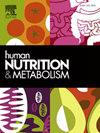Food insecurity and health behaviors in a disaster-affected population: A case study of Tacloban, Philippines
IF 1.8
Q3 ENDOCRINOLOGY & METABOLISM
引用次数: 0
Abstract
Background
Food insecurity is a widespread issue that poses a major global challenge with far-reaching impacts.
Objective
Investigate the relationship between food insecurity and health behaviors among the population of Tacloban, Philippines, affected by Typhoon Haiyan in 2013.
Methods
This study employed a cross-sectional design, surveying 226 households between April 2022 and June 2023. Households were selected using a systematic random sampling technique to ensure representative coverage. To evaluate food insecurity, we utilized the Food Insecurity Experience Scale-a robust tool that captures the degree to which individuals or households face challenges in accessing sufficient and nutritious food due to economic and social constraints. In addition, we explored a variety of health-related behaviors among participants, including the use of traditional healing practices, engagement in physical activity, sleep patterns and duration, dietary habits, medication adherence, as well as alcohol and tobacco use. The relationships between food insecurity and these health behaviors were rigorously examined using multiple logistic regression analysis, providing valuable insights into the interplay between access to food and lifestyle choices within the community.
Results
The results showed that 94 % of households experienced food insecurity, with 27 % severely, 52 % moderately, and 15 % mildly food insecure. The analysis revealed significant associations between food insecurity and several health behaviors. Food insecurity was found to be significantly associated with lower medication adherence, greater use of traditional healers, poorer dietary habits, and sleeping problems. However, no significant associations were found between food insecurity and smoking behavior, physical activities, or alcohol consumption.
Conclusion
Based on these findings, the study concluded that food insecurity negatively impacts health behaviors. Therefore, the authors suggested that improving food security in households could potentially lead to improvements in health behaviors.
受灾人口的粮食不安全和健康行为:以菲律宾塔克洛班为例
粮食不安全是一个广泛存在的问题,对全球构成重大挑战,影响深远。目的探讨2013年菲律宾塔克洛班市受台风“海燕”影响人群食物不安全与健康行为的关系。方法本研究采用横断面设计,在2022年4月至2023年6月期间调查了226户家庭。采用系统随机抽样技术选择住户,以确保有代表性的覆盖率。为了评估粮食不安全状况,我们使用了粮食不安全体验量表,这是一种强大的工具,可以衡量个人或家庭因经济和社会限制而在获取充足和有营养的食物方面面临挑战的程度。此外,我们还探讨了参与者之间的各种健康相关行为,包括使用传统治疗方法、参与体育活动、睡眠模式和持续时间、饮食习惯、药物依从性以及酒精和烟草使用。使用多元逻辑回归分析严格检查了粮食不安全与这些健康行为之间的关系,为社区内获得食物与生活方式选择之间的相互作用提供了有价值的见解。结果94%的家庭经历粮食不安全,其中27%为严重粮食不安全,52%为中度粮食不安全,15%为轻度粮食不安全。分析显示,粮食不安全与几种健康行为之间存在显著关联。研究发现,食物不安全与较低的药物依从性、更多地使用传统治疗师、较差的饮食习惯和睡眠问题显著相关。然而,没有发现食物不安全与吸烟行为、体育活动或饮酒之间存在显著关联。基于这些发现,该研究得出结论,粮食不安全对健康行为产生负面影响。因此,作者建议,改善家庭食品安全可能会导致健康行为的改善。
本文章由计算机程序翻译,如有差异,请以英文原文为准。
求助全文
约1分钟内获得全文
求助全文
来源期刊

Human Nutrition and Metabolism
Agricultural and Biological Sciences-Food Science
CiteScore
1.50
自引率
0.00%
发文量
30
审稿时长
188 days
 求助内容:
求助内容: 应助结果提醒方式:
应助结果提醒方式:


